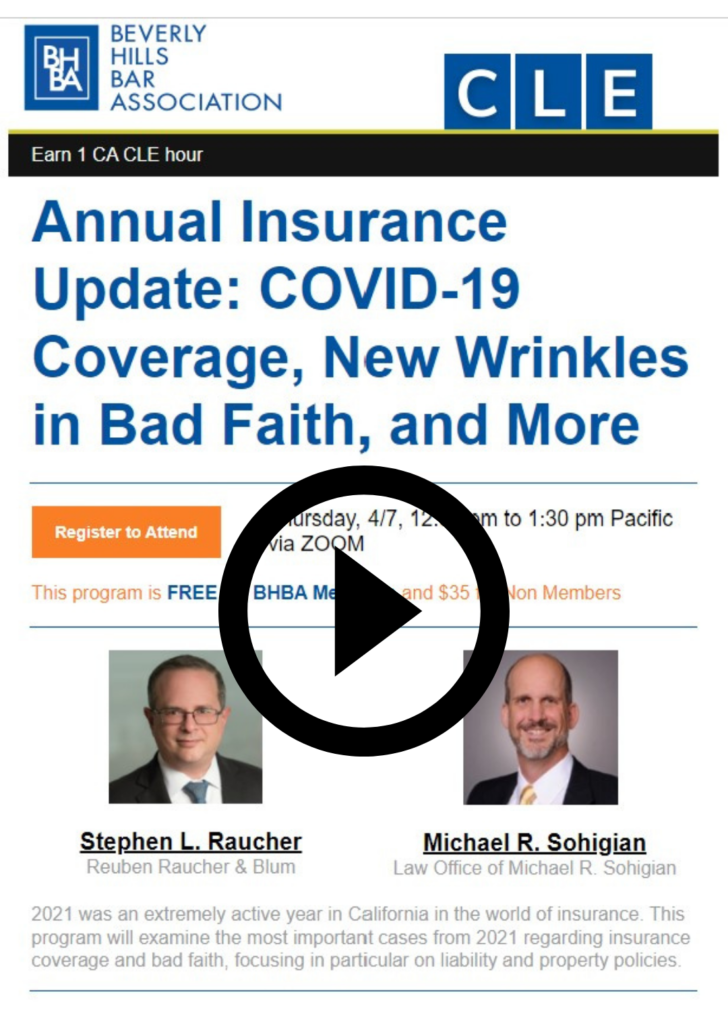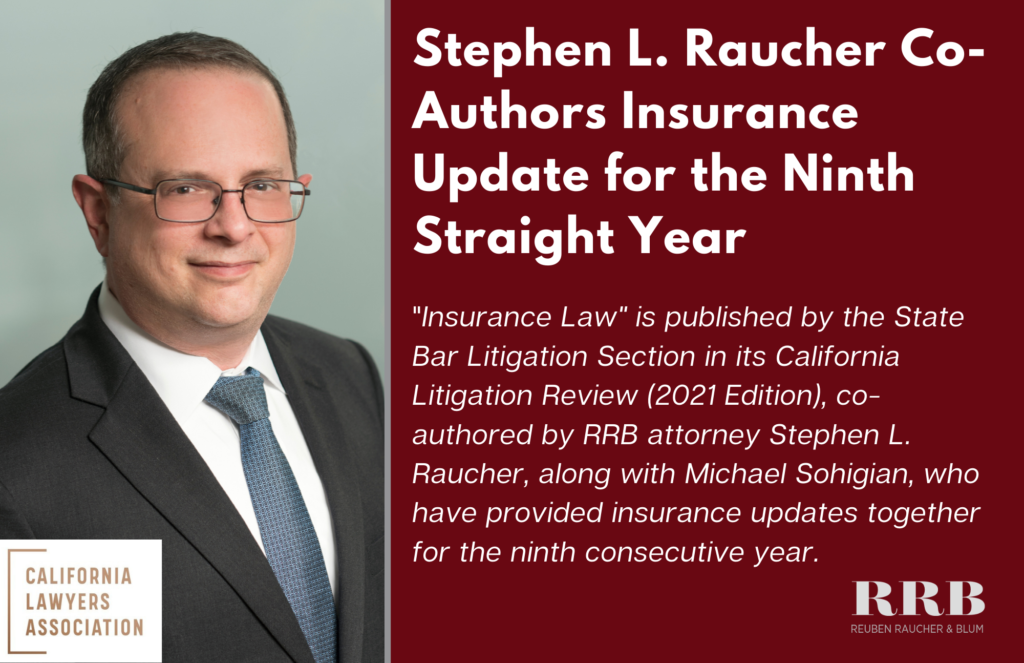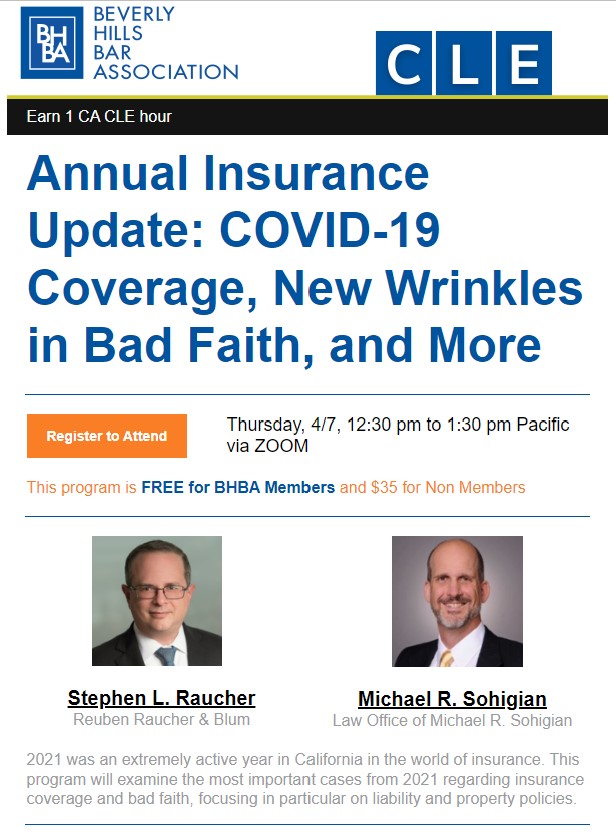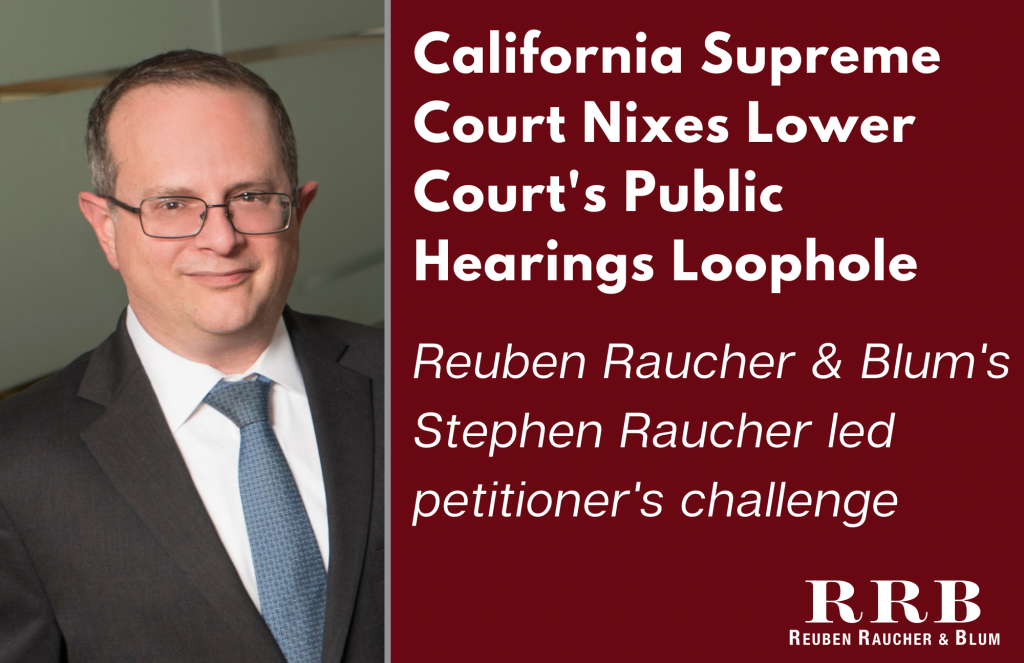Stephen Raucher’s article Closing a Habitability Exclusion Loophole is published in the Los Angeles Daily Journal on September 13, 2022.
Blog Archives
Steve Raucher Testimonial from 5-2022
Steve Raucher has guided me through an extremely complex and emotionally charged twelve year litigation marathon. Steve remains the same unflappable, quietly confident, and more than capable litigator now as when we first met. Reuben, Raucher & Blum has more than earned my other matters as well.”
Testimonial John Ward
I was in the middle of a complex habitability lawsuit and my original attorney was flailing. Stephen Raucher was recommended highly. We hired Stephen and he was able to make the case settle. Not too long after that case, we had a water damage issue at an apartment causing $70,000 in repair. The insurance company denied the claim and within 2 weeks of bringing Stephen into the matter, they agreed to cover all the damage. He is awesome!!”
Stephen L. Raucher Co-Authors Insurance Update for the Ninth Straight Year
Insurance Law is published by the State Bar Litigation Section in its California Litigation Review (2021 Edition), co-authored by RRB attorney Stephen L. Raucher, along with Michael Sohigian, who have provided insurance updates together for the ninth consecutive year.
Annual Insurance Update: COVID-19 Coverage, New Wrinkles in Bad Faith, and More
On Thursday, April 7, 2022, Stephen L. Raucher and Michael R. Sohigian will present an MCLE webinar through BHBA entitled “Annual Insurance Update: COVID-19 Coverage, New Wrinkles in Bad Faith, and More” (register in link). The program will examine the most important cases from 2021 regarding insurance coverage and bad faith, focusing in particular on liability and property policies.
Annual Insurance Update: COVID-19 Coverage, New Wrinkles in Bad Faith, and More
On Thursday, April 7, 2022, Stephen L. Raucher and Michael R. Sohigian presented an MCLE webinar through BHBA entitled “Annual Insurance Update: COVID-19 Coverage, New Wrinkles in Bad Faith, and More“. The program examined the most important cases from 2021 regarding insurance coverage and bad faith, focusing in particular on liability and property policies.

California Supreme Court Nixes Lower Court’s Public Hearings Loophole
Reuben Raucher & Blum prevails at the California Supreme Court in a precedent-setting decision finding in favor of Hill RHF Partners, L.P. Stephen Raucher argued the case for petitioners, leading to a unanimous decision. Read the press release here.
Stephen L. Raucher Argues Before California Supreme Court
On October 5, 2021, Stephen L. Raucher appeared before the Supreme Court of California on behalf of Retirement Housing Foundation in a consequential case that will determine how thoroughly a property owner must exhaust administrative remedies before challenging the constitutionality of an assessment. Click here for a link to the oral argument.
Rethinking the Joint-Employer Standard
Stephen Raucher’s article Rethinking the Joint-Employer Standard is published in the Los Angeles Daily Journal on September 22, 2021.
Rethinking the Joint-Employer Standard
Rethinking the Joint-Employer Standard
Entitlement to Equitable Subrogation Does Not Transform Legal Claims Against Third Parties into Equitable Claims

In Michael Berg et al., v. Pulte Home Corp. (“Berg”), the Third District Court of Appeal analyzed the question of whether an entitlement to equitable subrogation, as opposed to the underlying action itself, determines the right to a jury trial. Berg v. Pulte Home Corp., 67 Cal. App. 5th 277, 282 (2021). Pulte Home Corp. (“Pulte”), a general contractor, was sued by homeowners for allegedly violating building standards, breach of contract, and breach of express warranty. St. Paul Mercury Insurance Company (“St. Paul”) defended Pulte as an additional insured under a general liability policy.
Pulte had an agreement with its subcontractors whereby they each agreed to “indemnify and defend Pulte against all liability and claims, judgments, suits or demands for damages to persons or property arising out of, resulting from, or relating to that subcontractor’s performance of the work under the Agreement and any Contractor Project Agreement”. It was undisputed in Berg that there were alleged damages that resulted from or related to each of the subcontractors’ work for Pulte.
St. Paul thereafter sought reimbursement for the defense of St. Paul from three of these subcontractors through equitable subrogation. This claim rested on the assertion that the subcontractors were in breach of their contract with Pulte. The trial court found that St. Paul had proven all elements of its equitable subrogation claim. Damages were awarded and determined by a jury trial in a second phase.
St. Paul appealed, arguing that there is no right to a jury trial in an equitable subrogation claim because it is a claim in equity. This argument relied on a conclusion reached by the Fourth District Court of Appeal in Pulte Home Corp. v. CBR Electric, Inc., 50 Cal. App. 5th 216 (2020), namely that no jury trial right exists in such an equitable subrogation action. However, the Berg court reasoned that, “an insurer’s entitlement to equitable subrogation does not transform its insured’s legal claims against third parties into equitable ones.” Therefore, it disagreed with the conclusion reached in CBR Electric.
The Berg Court reasoned that equitable subrogation consists of two phases: entitlement and enforcement. The first phase (entitlement) asks whether the insurer is entitled to equitable subrogation, and the Berg court concluded such an inquiry is appropriately performed by a trial court sitting as a court of equity. In the second phase (enforcement), where the question is whether the insurer prevails against the third parties, the Court reasoned that the right to a jury trial was dependent on the nature of the claim(s). In sum, if the underlying claim is legal, then a jury trial is appropriate. Likewise, if the underlying claim is of an equitable nature, then a court of equity would be the trier of fact. Notably, the Berg Court found support for this two-phase approach in the Supreme Court of California’s decision in Offer v. Superior Court. While that case did not address this exact question, it “distinguish[ed] between the equitable nature of subrogation…and the independent equitable or legal nature of the action to which the insurer asks to be subrogated on the other.” (Citing Offer v. Superior Court, 194 Cal. 114, 123 (1924)).
As noted previously, St. Paul’s claim was based on a breach of contract – a legal claim. Thus, based on the foregoing reasoning, the Court affirmed the decision of the trial court to grant a jury trial.
Stephen L. Raucher Co-Authors Insurance Update for the Eighth Straight Year
Insurance Law is published by the State Bar Litigation Section in its California Litigation Review (2020 Edition), co-authored by RRB attorney Stephen L. Raucher, along with Michael Sohigian, who have provided insurance updates together for the eighth consecutive year.
21-Day Safe Harbor Provision Does Not Apply to Fee Request in Opposing Frivolous Anti-SLAPP Motion

In Changsha Metro Grp. Co., Ltd. v. Xufeng, 57 Cal. App. 5th 1 (2020), the Court of Appeal, Fourth Appellate District, clarified that the “safe harbor” provision of Code of Civil Procedure Section 128.5 does not apply where attorney’s fees are sought by a party opposing an anti-SLAPP motion which the court finds to have been frivolous.
The trial court found that Defendants Peng Xufeng and Jia Siyu filed a frivolous anti-SLAPP motion against Changsha Metro Group Co., Ltd. The trial court then ordered Defendants to pay Changsha $61,915 for Changsha’s attorney’s fees in opposing the anti-SLAPP motion. Defendants appealed, arguing (1) that they were not given a 21-day safe harbor period within which to withdraw their motion, and (2) Changsha requested attorney’s fees in its opposition to the anti-SLAPP motion, rather than in a separate motion. Defendants appealed and the Court of Appeal affirmed.
The anti-SLAPP statute states that, if an anti-SLAPP motion is frivolous, then “the court shall award costs and reasonable attorney’s fees to a plaintiff prevailing on the motion, pursuant to Section 128.5.” Code of Civil Procedure § 425.16(c)(1). However, the anti-SLAPP statute also requires that the hearing on the motion be scheduled not more than 30 days after service. Code of Civil Procedure § 425.16(f).
Code of Civil Procedure § 128.5(a) states, “A trial court may order a party, the party’s attorney, or both, to pay the reasonable expenses, including attorney’s fees, incurred by another party as a result of actions or tactics, made in bad faith, that are frivolous or solely intended to cause unnecessary delay.” Moreover, Section 128.5(c) states, “Expenses pursuant to this section shall not be imposed except on notice contained in a party’s moving or responding papers or, on the court’s own motion, after notice and opportunity to be heard.” Therefore, attorney’s fees may be awarded as expenses, and expenses may be requested in a party’s responding papers, which is what Changsha did.
In regards to Defendants’ arguments, Code of Civil Procedure § 128.5(f) authorizes the trial court to impose sanctions, which can include attorney’s fees, if (1) the motion is “made separately from other motions or requests,” and (2) a 21-day safe harbor notice is served if the offending document can be withdrawn or corrected. Code of Civil Procedure § 128.5(f)(1)(A) & (B). However, the Court found that subdivision (f), which requires an order under subdivision (a), is not compatible with subdivision (c), reasoning that “If one obtains an order under subdivision (a), then the safe harbor provision of subdivision (f) is rendered meaningless because it will be impossible to withdraw a motion or pleading that has already been found to be frivolous or not under subdivisions (a) and (c).” Id. at 11-12. Moreover, the 21-day safe harbor provision is incompatible with the requirement that an anti-SLAPP motion be heard within 30 days of service.
After analyzing the statutes and reviewing the relevant legislative history, the Court concluded that subdivision (f) does not work with the anti-SLAPP statute. Accordingly, the Court held “that if it is not possible to comply with the safe harbor and separate motion requirements of subdivision (f) when seeking attorney’s fees, then one should use the procedures set forth in subdivisions (a) and (c).” Id. at 18. The Court further concluded, “when it is not practical to apply the safe harbor provision then it need not be used.” Ibid. Thus, a party seeking sanctions under Section 128.5 for opposing a frivolous anti-SLAPP motion may simply seek attorney’s fees as part of its opposition, without complying with the 21-day safe harbor procedure.
Annual Update On Developments In Insurance
On Thursday, February 4, 2021, Stephen L. Raucher presented a continuing legal education program entitled “Annual Update on Developments in Insurance.” The program examined the most important new cases from 2020 regarding insurance coverage and bad faith, focusing particularly on liability and property policies.
RRB Scores Victory in District Court Class Action Suit
On October 27, 2020, USDC Judge James Donato struck down a California plaintiff’s bid to represent non-Californians in a nationwide class alleging that O Organics LLC’s kombucha drinks mislead consumers about their alcohol content. Reuben Raucher & Blum successfully defended O Organics in demonstrating the significant differences between California consumer protection laws and consumer protection laws in other states which would make a nationwide class untenable. The decision was published in a Law360 article entitled “Nationwide Class Struck From Kombucha False Ad Suit”.
RRB’s New Associate – Trenton Hartzler
Reuben Raucher & Blum is pleased to announce that Trenton Hartzler has joined the firm as an Associate.
Hill RHF Housing Partners, L.P. v. City of Los Angeles
12 Cal.5th 458 (2021) (administrative exhaustion) (unanimous reversal by California Supreme Court)


